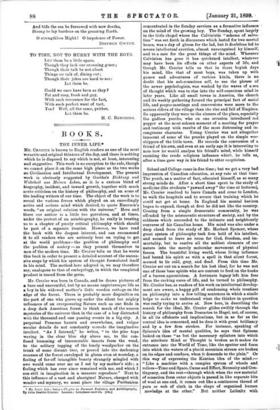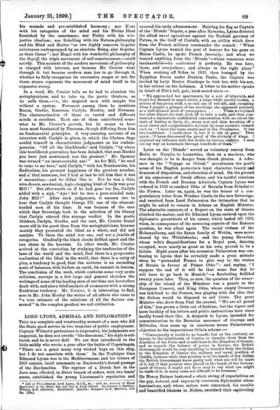BOOKS.
THE INNER LIFE.•
Mn. CROZIER is known to English readers as one of the most versatile and original thinkers of the day, and there is nothing which he is disposed to say which is not, at least, interesting and suggestive. This work is no exception to the rule, though we cannot place it on the same high plane as the two works on Civilisation and Intellectual Development. The present work is obviously suggested by Goethe's Dichtung and Wahrheit aue Meinen Leben, as it is a curious blend of biography, incident, and inward growth, together with much acute criticism on the history of philosophy, and on some of the leading writers of our time. The object of the work is to reveal the various forces which played on an exceedingly active and serious mind which desired, to quote Emerson's words, "an original relation with the universe." Here and there our author is a little too garrulous, and at times, under the pretext of an autobiography, he really is treating us to a chapter of purely critical philosophy which should be part of a separate treatise. However, we have read the book with the deepest interest, and can recommend it to all readers who are seriously bent on trying to get at the world problems—the problem of philosophy and the problem of society — as they present themselves to men of the modern time. Mr. Crozier tells us that he wrote this book in order to present a detailed account of the succes- sive steps by which his system of thought formulated itself in his mind. The method here adopted is, we may therefore say, analogous to that of embryology, in which the completed product is traced from the germ.
Mr. Crozier was born in Canada, and he draws pictures of a bare and uneventful, but by no means unpicturesqne life as a boy in his widowed mother's little wooden cottage on the edge of the forest. There is probably more disposition on the part of one who grows up under the silent but mighty influences of an overpowering Nature such as one finds in a deep dark American forest to think much of the unseen mysteries of the universe than in the case of a boy distracted with the thousand and one passing events in a big city. A perpetual Presence haunts and overwhelms, and vulgar secular details do not constantly corrode the imaginative intellect. "As I listened," he writes, " to the pine tops waving in the clear blue sky above me, to the con- fused humming of innumerable insects from the wood, to the solitary tapping of the lonely woodpecker on the trunk of some distant tree, or peered into the darkening recesses of the forest enveloped in gloom even at noonday, a feeling of far-off intangible beauty strangely mingled with awe would come over me as I sat by my mother's side ; a feeling which has ever since remained with me, and which I can still in imagination in a measure reproduce." Next to this influence of a vast and aboriginal Nature, charged with wonder and mystery, we must place the village Puritanism
• Mu Inner Life : bring n Ch,:pter in Personal Rvolutian and Autobiography. By John Beattie Crozier. London : Longmans and Co. Ilia.] concentrated in the Sunday services as a formative influence on the mind of the growing boy. The Sunday, spent largely in the little chapel where the Calvinistic "scheme of salva- tion " was set forth in discourses which lasted for two mortal hours, was a day of gloom for the lad, but it doubtless led to severe intellectual exertion, almost unrecognised by himself, and to a care for the great things of the mind. Wherever Calvinism has gone it has quickened intellect, whatever may have been its effects on other aspects of life, and though Mr. Crozier tells us that in these boyish days his mind, like that of most boys, was taken up with games and adventures of various kinds, there is no doubt that his sub-conscious self, to use the phrase of the newer psychologists, was washed by the waves of a sea of thought which was to rise into the self-conscious mind in later years. Like all small towns in America, the church and its weekly gathering formed the principal fact of social life, and prayer-meetings and conversions were more to the serious elders of the village than the rise and fall of Empires. So apparently they were to the sinners of the place, especially the godless youths, who on one occasion introduced red pepper at the most solemn moment of a meeting for prayer and testimony with results of the most distressing and in- congruous character. Young Crozier was not altogether innocent of some of the pranks played on the simple wor- shippers of the little town. He records the conversion of a friend of his own, and even at an early age it is interesting to note how be would analyse his friend's mind, while himself resisting the crude religious influence which, he tells us, after a time gave way in his friend to utter scepticism.
School and College came in due time ; but we get a very bad impression of Canadian education, at any rate at that time. The youth, as a matter of fact, educated himself, as so many strong minds do. After a short time spent in the study of medicine (the students "yawned away" the time at lectures), Mr. Crozier resolved to leave Canada and come to London, to walk the hospitals and to secure that training which he could not get at home. In England his mental horizon began to expand, though at first he did not like the country. Coming from a simple democratic community, he was offended by the aristocratic structure of society, and by the coldness which succeeded to the intimate and neighbourly converse of his Canadian home. His mind was also under a deep cloud from the study of Mr. Herbert Spencer, whose great system of philosophy took firm hold of his intellect, and seemed to leave no room for God, freedom, and im- mortality, but to resolve all the noblest elements of our nature into the merely molecular movement of physical forces. The beautiful living world, whose living influence had bound his spirit as with a spell in that silent forest, seemed to lie cold, grey, and dead. From this time Mr. Crozier set out on a search for his lost ideal, for he was not one of those base spirits who are content to feed on the husks of a barren agnosticism. A fortunate legacy left him free from the carking cares of life, and be turned to philosophy. Mr. Crozier has, as readers of his work on intellectual develop- ment are aware, a happy gift of condensing whole treatises on philosophy into a few telling sentences in which a simile helps to make an understand what the thinker in question was really trying to arrive at. Now here, in describing the search for the ideal, Mr. Crozier glides swiftly through the history of philosophy from Descartes to Hegel, not, of course, in all its offshoots and implications, but in so far as the central idea is concerned, and he does it with great brilliancy and by a few firm strokes. For instance, speaking of Spinoza's idea of mental qualities, he says that Spinoza looked on these "as but the necessary splinters into which the attribute Mind or Thought is broken as it makes its entrance into the World of Time, like the sputter and foam into which the waters of a placid mountain stream are broken on its edges and confines, when it descends to the plain." Or this way of expressing the Kantian idea of the mind :— " Like a machine with a complex system of wheels and rollers—Time and Space, Cause and Effect, Necessity and Con- tingency, and the rest—through which when the raw material of sensation from outer objects is passed in like separate bits of wool at one end, it comes out like a continuous thread of yarn or web of cloth in the shape of organised human nowledge at the other." But neither Leibnitz with
his monads and pre-established harmony ; nor Kant with his categories of the mind and his Divine Ideal furnished by the conscience ; nor Fichte with his sub- jective idealism ; nor Schelling with his Nature-philosophy and his Mind and Matter "as two highly concrete bi-polar substances underpropped by an absolute Being, also bi-polar, as their Cause "; nor Hegel with his wonderful philosophy of the Begraff, the triple movement of self-conscioueness,—could satisfy. This account of the modern movement of philosophy is charged with interest, not because Mr. Crozier went through it, but because modern man has to go through it, whether he fully recognises its successive stages or not, for these stages represent the movement of mind itself in its expansive sweep.
In a word, Mr. Crozier tells us he bad to abandon the metaphysicians, and to take up the poetic thinkers, as he calls them,—i.e., the inspired men with insight but without a system. Foremost among these he mentions Bacon, Goethe, Emerson, Carlyle, Raskin, and Newman. The characterisation of these so varied and different minds is excellent. Each one of them contributed some- what to Mr. Crozier's growth, but he seems to have been most fascinated by Emerson, though differing from him on fundamental principles. A very amusing account of an interview with Carlyle is given, in which the Chelsea Sage outdid himself in characteristic judgments on his contem- poraries. "Of all the blockheads," said Carlyle, "by whom this bewildered generation has been deluded, that man Buckle you have just mentioned, was the greatest." Mr. Spencer was termed " an immeasurable ass ! " As for Mill, "he used to come to me here," said Carlyle, " with his Benthamism, his Radicalism, his greatest happiness of the greatest number, and a' that nonsense, but I had at last to tell him that it was a' moonshine,—and he didna' like it. But he was a thin, wire-drawn, sawdustish, logic-chopping kind of body was poor Mill !" But afterwards, as if he had gone too far, Carlyle added with a sigh, "Aye ! but he was a pure-minded man, John Mill !" After such judgments, it amuses one to hear that Carlyle thought George III. one of the clearest- headed men of his time. It was because of the care which that Sovereign took in the selection of his library that Carlyle uttered this strange verdict. In the poetic thinkers, Carlyle, Goethe, and the rest, Mr. Crozier found more aid in his quest than from the metaphysicians, because mainly they presented the Ideal as a whole, and did not analyse. To them the mind was one, and not a jumble of categories. Gradually the black clouds drifted apart and the sun shone in the heavens. In other words, Mr. Crozier arrived at the conviction, by studying the tendencies of the laws of the world and the mind, that there is a progressive realisation of the Ideal in the world, that there is a unity of plan, a tendency to good, that the universe is an ascending scale of balances, with its foot on earth, its summit in heaven. The conclusion of the work, which contains some very acute criticism, surveys in a few large and general sketches the writings of some of the leading men of our time not heretofore dealt with, and also a brief analysis of economics with a strong Ruskinian tendency. Mr. Crozier, it is interesting to find, sees in Mr. John Morley the writer of all others who came to "a true estimate of the relations of all the factors con- cerned" in the complex product we call civilsation.



































 Previous page
Previous page